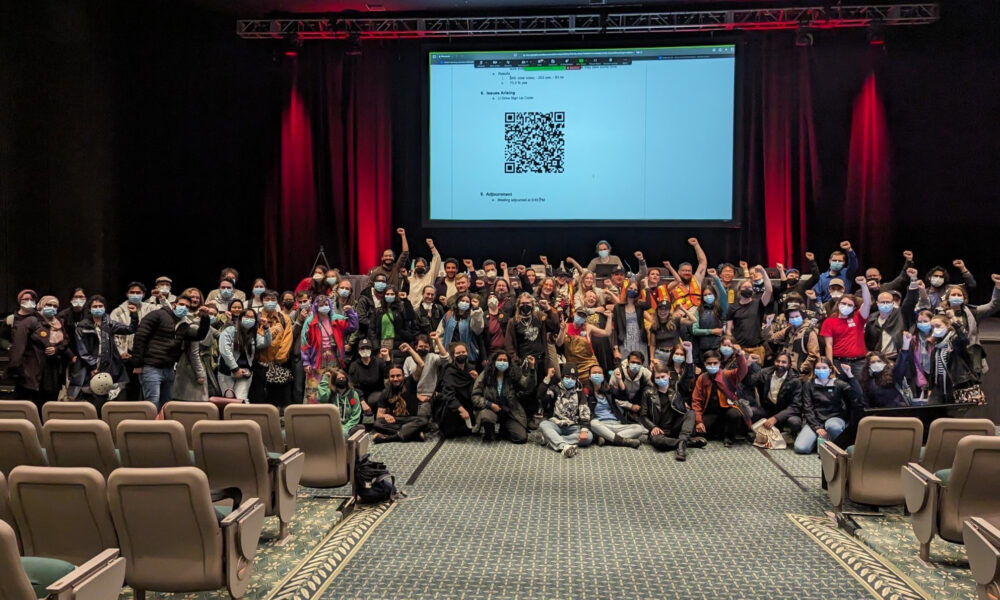After nearly a month of striking, the Association of Graduate Students Employed at McGill (AGSEM)—the union representing Teaching Assistants (TAs)—and McGill reached a tentative agreement on Monday, April 15. On Thursday, April 18, AGSEM held a General Assembly (GA) for TAs, during which 75 per cent of attendees voted in favour of the tentative agreement, ratifying the agreement. The ratification of the agreement ended the strike, which began on March 25. Once the union signs the contract, for which a date has not yet been set, it will be enforced as the new Collective Agreement (CA) between TAs and McGill.
Out of AGSEM’s three major monetary demands that it set out in December 2023—a 40 per cent pay raise with a cost-of-living adjustment, health care, and indexation of work hours—the tentative agreement made the most headway regarding a pay raise. According to AGSEM’s press release about the union’s last bargaining meeting with the university, both parties agreed on a 15.5 per cent net pay raise over the next three years, or a 16.4 per cent pay raise compounded. The compounded raise, which considers the raise rate increase of the following years, indicates the increase. This raise will be executed incrementally, from August 1, 2023, to August 1, 2026.
The increase obtained for TAs starting in August 2023 and February 2024 will be paid retroactively to workers within 90 days of the CA’s ratification. McGill maintained a firm stance against AGSEM’s demands to potentially increase TAs’ wages if inflation is higher than three per cent per year, as part of a cost-of-living adjustment, in addition to the raises stated in the new CA.
The union and the university also did not agree on the indexation of TAs’ working hours to the number of students in the class. However, they tentatively agreed on clauses that would make the process of allocating TA work hours and teaching support budgets more transparent while creating ways for TAs to respond to the organization of their work and pay. According to Dallas Jokic, one of the AGSEM bargaining committee’s members, these new elements in the tentative agreement are a major win for the union.
“Our union, and pretty much every other TA union across Quebec and Canada has been fighting to index TA hours to undergrad enrollment for decades. While we were not able to win this, we were, for the first time, able to win real transparency in how TA hours are allocated and avenues to provide feedback when hours are cut or improperly allocated,” Jokic wrote in an email to The Tribune.
The tentative agreement also does not address AGSEM’s healthcare demands. Even though AGSEM wanted gender affirmation leave to be more clearly established within the contract, their attempt was unsuccessful. According to the union’s newsletter, McGill explained that gender affirmation leave is already included in the agreement through clauses relating to medical leave. Now, AGSEM calls on the university to include language establishing that misgendering and deadnaming are a form of harassment of transgender TAs in its Policy on Harassment and Discrimination, which will be reviewed during the 2024-2025 academic year.
In a written statement to The Tribune, McGill’s Media Relations Office stated that McGill will review the policy through a community consultation so that the university can address the issue of misgendering and deadnaming.
“We take the issue seriously, recognizing the deep challenges that trans members of our community can face,” the Office wrote. “The review of the Policy on Harassment and Discrimination must, according to its own terms, follow a community consultation and the issue about how to address meaningfully and seriously deadnaming and use of preferred names and pronouns will be looked at seriously in that context.”
Barry Eidlin, associate professor in the Department of Sociology, explained in a statement to The Tribune that this tentative agreement demonstrates the fruits of TAs’ organizing effort, but also how the university administration begrudgingly compromises in negotiations concerning on-campus unions, even during a strike.
“I think the AGSEM agreement is the product of a hard-fought strike. It’s far more than [TAs] would have been able to win without going on strike,” Eidlin wrote. “That being said, it leaves a lot of unfinished business, largely due to the McGill administration’s obstinate refusal to take TAs’ working conditions seriously.”
Eidlin also shared that he believed that, through the TA strike, the administration showed itself willing to create a divisive environment on campus instead of focusing on bringing an agreement that agrees with the university’s and the union’s conditions to life.
“They showed in their actions that they were far more interested in asserting their own power and dividing the campus community than in actually negotiating a fair agreement for TAs that addressed their core concerns. They demonstrated this in their policies, like ordering faculty to take on hundreds of extra hours of work normally done by TAs for no additional compensation or consideration. Not only was this an attempt to enlist professors directly on the side of management to undermine our own students, but it ran the risk of poisoning the campus climate for far longer than the strike lasted, pitting professors against students, and undergraduates against graduate students,” Eidlin stated.
As the tentative agreement was ratified, TAs are heading back to work in time to grade final exams. AGSEM says that the new CA will be signed as soon as the tentative agreement is translated from English to French—the official language for legal documents in Quebec. Until then, it is still possible that the tentative agreement be changed.
Jokic stated that, while some considerable demands were not met by the university, he believes that the strike had an obvious impact on the result of the year-long bargaining process, which started last September.
“We had to fight for every single win we got in this agreement, and while TAs deserve more, I think we can be proud of how much our strike won us.”








